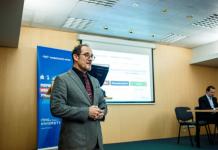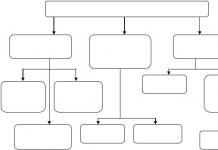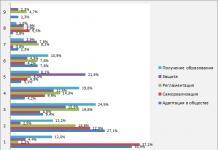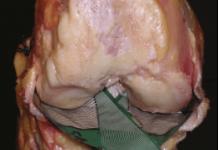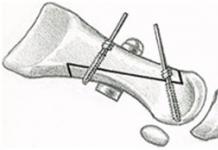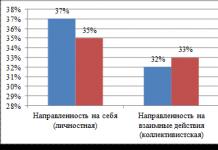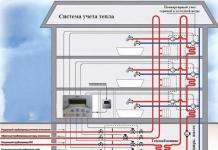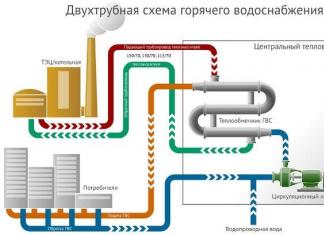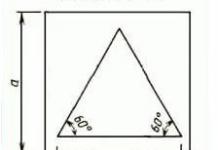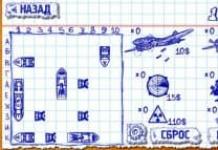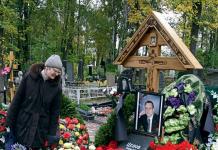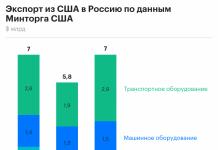The formation of the personality of a student of a non-pedagogical specialty as a professional is a sphere of social and psychological practice, where the interests of society and a particular person are closely intertwined. For society, professionalization is, first of all, a means of mediating cultural and material benefits, without which it is impossible to imagine either its existence, let alone development. For a particular person, professionalization is a form of inclusion in the socio-economic processes of society, a way of development, self-realization and self-actualization, a source of livelihood. Moreover, with the growth of technological progress, the development of human intelligence, the improvement of social relations, the role of psychological knowledge, which forms the personality of any professional, especially a specialist working with people, increases.
The problem of the professional development of a personality is directly related to the issues of mastering professional activities, to the development and realization of a personality at various stages of its professional path. In modern psychological literature, the process of professional development is understood as a holistic phenomenon that includes both objective components (the prestige of the profession, its social competitiveness) and subjective nature (the attitude of the individual to the profession, to oneself as a professional, the severity of professional abilities, professional ideals, experience of successes and failures in professional activity).
The development of the problem of professionalization of students of non-pedagogical specialties in domestic psychological practice goes along two scientific and practical directions. On the one hand, in practical psychology (V. A. Bodrov, K. K. Platonov, K. M. Gurevich, B. M. Teplov) the point of view dominates that the requirements of the profession are realized within the framework of the theory of individual differences and professional psychological selection. Professional fitness is assessed by the level of development of psychological properties and psychophysiological qualities, sensorimotor and neuropsychic stability, based on the primacy of general abilities and the secondary nature of psychological changes. Motivation is a component of the overall development system, which is formed and implemented in the process of mastering activities.
On the other hand, researchers of professional self-determination, standing on the positions of humanistic "understanding" psychology, include personality development in the sphere of professional orientation (E. A. Klimov, I. V. Dubrovina, M. S. Savvina, N. S. Pryazhnikov). They seek to highlight the activity, self-realization and motivation of the individual, which stimulates the development of the subject of labor. This is reflected in the applied approaches of psychological assistance, methods, as well as in the results of the study.
V. A. Bodrov considers the professional development of students from the standpoint of the professional suitability of a person who has certain qualities determined by the performance of socially significant activities, social status and professional role, socially significant norms and values of behavior, level of education and special training.
The psychological approach for studying and assisting in professionalization and the formation of adequate behavior in the learning process requires, in addition to assessing psychological qualities, knowledge, skills, patterns and trends in changing its professional orientation, taking into account the significance of the conditions and meaning of educational activity. The regulation of the individual typological originality of behavior, activity, depending on his satisfaction with training and taking into account his functional capabilities to manage his functional state, requires knowledge of the mechanisms, patterns, stages, crises and conditions for the professional development of students of non-pedagogical specialties.
The significance of training is characterized by: the subjective meaning of future work activity, motivation, the place of work in the life of an individual, the regulation of labor and the main roles in the process of mastering and performing activities, which is the expectation of a decent lifestyle for a professional. These characteristics must be consistent between the tasks performed in the learning process and the methods for assessing the adequacy of behavior and require the development of a psychological concept that justifies the provision of assistance to students.
The formation of individuality should be considered as an aspect of the quality of life, as a process of movement towards a conscious life goal, during which a comprehensive development of the inclinations and abilities of a professional takes place.
Along with the scientific understanding of the professionalization of the individual, it is necessary to take into account the practical problems that this area of psychological knowledge is aimed at solving.
The practice of professional activity confronts a person with the problem of increasing skill, reliability and high efficiency. These problems necessitate the achievement of mutual correspondence between the qualities of a person and the requirements of the profession based on the integrative application of the knowledge of pedagogy, psychology, medicine, ergonomics, engineering, and technology for the development of production forces.
To study the essence of human professionalization, it is necessary to know the laws: the development of the subject of labor, the normative characteristics of labor, the stages of the formation of professionally important qualities, the reliability of a person in the performance of professional tasks, taking into account the socio-psychological and substantive characteristics of labor.
From the standpoint of a systematic approach adopted in Russian psychology, professionalization is manifested in the bidirectionality of its meaning: on the one hand, the professional environment affects a person, activating his development, and on the other hand, a person, as an individual, cognizing the environment, influences it and changes it in accordance with their abilities and capabilities.
A systematic approach to the problem of professionalization of a person dictates the need to consider it as a system of features of a person as an individual, as an individual and as a person, that is, as a "hierarchical system of human qualities" .
From these positions, the individuality of a person is presented as a multi-level hierarchical system in which a different number of levels are distinguished. For example, K. K. Platonov proposes to single out the following organic levels: somato-morphological, biochemical, physiological individuality. In the psychological sphere, he singles out a procedural mental individuality and a meaningful mental individuality, which is the product of his interaction with the world. The mental level open to the environment is a socio-psychological individuality, characteristic only of a person.
In the most general form, the problem of the relationship between the individual, personality and individuality was developed by V. S. Merlin. According to him, the concepts of "individual" and "personality" are included in a more generalized concept of "individuality", which is considered as a hierarchically ordered system of properties of different levels of its development. The integral individuality itself is defined by him as "a holistic characteristic of the individual properties of a person."
E. P. Ilyin, defining a person as a systemic organization, identifies three levels of response: mental, physiological and behavioral.
Along with the psychophysiological paradigm of studying the professional development of students of non-pedagogical specialties, the cognitive approach to studying professionalization, which originates in the works of R. Lazarus, is gaining more and more recognition, based on the fact that personality development occurs as a result of an individual's cognitive assessment of his ability to adapt to the requirements environment. The most detailed mechanism of cognitive assessment in personality development is presented in the work of T. Cox, where it includes four factors in this process:
1. Evaluation of the requirements for the individual.
2. Evaluation of individual characteristics, skills and general abilities for development (personal resources) in accordance with the requirements of the environment.
3. Assessment of situational constraints affecting the development process.
4. Assessment of the availability of external support.
A person constantly faces problems that require mental stress from her, an adequate level of activity and determination of her attitude: to the profession, herself, the choice of the subject of labor, the choice of an educational institution, the formation and development of professionally important qualities, reflection of her own professional achievements; to clarify and correct a career. These vital problems confront the individual throughout his professional life and lead to certain mental states.
The most important criterion for the awareness and productivity of the professionalization of a person is his ability to find the personal meaning of work, independently design his professional life, which many researchers associate with self-determination.
Professional self-determination is a conscious act of choosing a profession and asserting one's own position in the process of mastering it. N. S. Pryazhnikov emphasizes the connection of professional self-determination with self-realization: “The essence of professional self-determination is the independent and conscious finding of the meanings of the work performed and all life activity in a specific cultural and historical (socio-economic) situation” .
Analyzing the concept of "professional development", E. A. Klimov emphasizes that this is not a single decision-making act, but constantly alternating elections. The most relevant, the choice of a profession becomes in adolescence and early youth, but in subsequent years the problem of revision and correction of a person's professional life arises.
P. G. Shchedrovitsky, considers becoming as a person's ability to build his own position and change himself, his individual history, as the ability to rethink his own essence.
Professional development fills a person's life with a special meaning, develops his abilities and personal qualities.
In a modern university, it is not enough to form only a system of knowledge, skills and abilities, it is necessary to develop the personality of a future professional. The main characteristic of higher professional education should be the consistency between the personal and professional development of a person.
Thus, for the implementation of the process of professional development for students of non-pedagogical specialties, it is necessary: the presence of a basic level of knowledge and skills required for each student, necessary for his full-fledged professional activity; an increase in the share of intellectual work, the inclusion of students in a variety of activities, meaningful connection between theoretical education and professional activities of students.
2 EMPIRICAL STUDY OF THE PECULIARITIES OF THE PROFESSIONAL FORMATION OF STUDENTS OF PEDAGOGICAL AND NON-PEDAGOGICAL SPECIALTIES: ANALYSIS AND INTERPRETATION OF THE RESULTS OF THE EMPIRICAL STUDY
As a result of the study, students of the pedagogical specialty “Mathematics. Scientific and Pedagogical Activities” and non-pedagogical specialty “International Law”, according to the following methods: “Methods for studying the motivation of learning at the university T.V. Ilina" (Appendix A),"Methods of studying the orientation of the personality Smekal - Kuchera » (Appendix B) and the Eysenck Personality Questionnaire (EPQ) (Appendix B), received primary data.
For a visual presentation of the results, the scores obtained during the study of the dynamics of the characteristics of the respondents in the pedagogical specialty were converted into percentages and displayed on histograms (Fig. 1-3).
At the first stage, we traced the dynamics of the distribution of the results obtained according to the “Methodology for studying the motivation for learning at the university T.V. Ilina”, for 2nd and 4th year students enrolled in the specialty “Mathematics. Scientific and pedagogical activity” (Fig. 1).
Figure 1 - Indicators of the distribution of results obtained by the method of studying the motivation for studying at the university T. V. Ilyina among students of the 2nd and 4th courses studying in the specialty “Mathematics. Scientific and pedagogical activity "(%)
According to the results presented in Figure 1, the motives for studying at a university among students studying in the specialty “Mathematics. Scientific and pedagogical activity” motives change in the process of professional development: “obtaining a diploma” and “mastering a profession” decrease with an increase in the motive “acquisition of knowledge”. If in the second year the main motivating factors for future teachers are mastering a profession and obtaining a diploma, then in the pre-graduation (fourth) year, the motive for acquiring the necessary professional knowledge, skills and abilities comes first.
Subsequently, we analyzed the indicators of the dynamics of the distribution of results obtained according to the "Methodology for studying the personality orientation of Smekal - Kuchera" among students of the 2nd and 4th courses studying in the specialty "Mathematics. Scientific and pedagogical activity” (Fig. 2).
According to the results presented in Figure 2, in the dynamics of the students of the pedagogical specialty, the level of focus on oneself decreases, with an increase in the levels of focus on mutual actions and focus on solving problems (business), that is, in the process of professional development, focus on oneself (solving problems with hope on one's own strength) is replaced by a focus on the mutual solution of problems and a focus on achieving the goal (business activity).

Figure 2 - Indicators of the distribution of results obtained by the method of studying the orientation of the personality Smekal - Kucher among students of the 2nd and 4th courses studying in the specialty "Mathematics. Scientific and pedagogical activity "(%)
Further, we analyzed the indicators of the dynamics of the distribution of results obtained according to the "Eysenck Personality Questionnaire" among students of the 2nd and 4th courses studying in the specialty "Mathematics. Scientific and pedagogical activity” (Fig. 3).
According to the results presented in Figure 3, the degree of severity of personality traits (extraversion / introversion, neuroticism, psychotism) in students studying in the specialty “Mathematics. Scientific and pedagogical activity” changes in dynamics. In particular, indicators of extraversion and neuroticism decrease, with an increase in the level of psychotism and sincerity.

Figure 3 - Indicators of the distribution of results obtained according to the Eysenck Personality Questionnaire among students of the 2nd and 4th courses studying in the specialty “Mathematics. Scientific and pedagogical activity "(%)
To test the hypothesis about the presence of significant differences in the characteristics of the professional development of students of pedagogical specialties in dynamics, the Mann-Whitney U-test was used. The differences on the scales at the level of statistical significance are presented in Table 1.
Table 1 - Indicators of significant differences in groups of students of pedagogical specialties of the 2nd and 4th courses (U-test of Mann - Whitney)
Note ** - Significance at the P level<0,01.
Significant differences in the severity of personal characteristics of students of pedagogical specialties in dynamics were found on the scale of "neuroticism", the value of the criterion U - 655.0 at the significance level P<0,01. Полученные данные свидетельствуют о том, что уровень нейротизма в процессе профессионального становления студентов педагогических специальностей существенно снижается. Значение Р – level свидетельствует о том, что статистикой описано 99,0 % анализируемой выборки. Таким образом, можно сказать, что нестабильность, неуравновешенность нервно-психических процессов, эмоциональная неустойчивость, а также лабильность вегетативной нервной системы студентов педагогических специальностей в процессе профессионального становления снижается, в связи с обретением уверенности в своих навыках и умениях, подтвержденных в ходе прохождения педагогической практики.
For a visual presentation of the results, the scores obtained in the course of studying the dynamics of the characteristics of respondents in a non-pedagogical specialty were converted into percentages and displayed on histograms (Fig. 4-6).
As a result of the study of the features of the professional development of students of non-pedagogical specialty, we have obtained the following results. Thus, the indicators of the dynamics of the distribution of results obtained according to the “Methodology for studying the motivation for studying at the university T. V. Ilyina” among students of the 2nd and 4th courses studying in the specialty “International Law” are shown in Figure 4.

Figure 4 - Indicators of the distribution of results obtained by the method of studying the motivation for studying at the university T. V. Ilyina among students of the 2nd and 4th courses studying in the specialty "International Law" (%)
According to the results presented in Figure 4, the motives for studying at a university in students studying in the specialty "International Law" change, in particular, in the process of professional development of students of a non-pedagogical specialty, the motive "getting a diploma" comes out on top, with a decrease in the importance of motives: "mastering profession” and “acquisition of knowledge”: if in the second year the main motivating factors for future lawyers are mastering the profession, acquiring the necessary professional knowledge in the chosen specialty, then by the end of training (fourth year), the motive “getting a diploma” comes first.
Subsequently, we analyzed the indicators of the dynamics of the distribution of results obtained according to the "Methodology for studying the personality orientation of Smekal-Kuchera" among students of the 2nd and 4th courses studying in the specialty "International Law" (Fig. 5).

Figure 5 - Indicators of the distribution of results obtained by the method of studying the orientation of the personality Smekal - Kuchera among students of the 2nd and 4th courses studying in the specialty "International Law" (%)
According to the results presented in Figure 5, in the dynamics of students of non-pedagogical specialty, the level of focus on themselves increases, while the level of focus on mutual actions decreases. The level of focus on solving problems (business) does not change in dynamics. Fourth-year students studying in the specialty "International Law" have an increased focus on themselves (solving problems with hope for their own strengths) with a decrease in the level of focus on mutual problem solving.
In the future, we traced the dynamics of the distribution of the results obtained according to the "Eysenck Personality Questionnaire" among students of the 2nd and 4th courses studying in the specialty "International Law" (Fig. 6).

Figure 6 - Indicators of the distribution of results obtained according to the Eysenck Personality Questionnaire among students of the 2nd and 4th courses studying in the specialty "International Law" (%)
According to the results presented in Figure 6, the degree of severity of personal characteristics in students of non-pedagogical specialty changes in dynamics. In particular, indicators of extraversion and psychotism decrease, with an increase in the level of neuroticism and sincerity: if in the second year the main personal characteristics for future lawyers are sociability, impulsiveness, insufficient self-control, good adaptability to the environment, openness in feelings, as well as inadequacy of emotional reactions, high conflict, self-centeredness, then by the end of training, instability, imbalance of neuro-psychic processes, emotional instability, as well as lability of the autonomic nervous system come first.
To test the hypothesis about the presence of significant differences in the characteristics of the professional development of students of non-pedagogical specialties in dynamics, the Mann-Whitney U-test was used. The differences on the scales at the level of statistical significance are presented in Table 2.
Table 2 - Indicators of significant differences in groups of students of non-pedagogical specialties of the 2nd and 4th courses (Mann-Whitney U-test)
Note - Significance at the P level<0,01; **- Значимость на уровне Р<0,001
Significant differences in the characteristics of the professional development of students of non-pedagogical specialties in dynamics were found on the following scales:
- mastery of a profession, the value of the criterion U-628.0 at the significance level P<0,001. Полученные данные свидетельствуют о том, что уровень овладения профессией в процессе профессионального становления студентов непедагогических специальностей существенно снижается. Значение Р–level свидетельствует о том, что статистикой описано 99,9 % анализируемой выборки.
- focus on oneself, the value of the criterion U-610.0 at the significance level P<0,001. Полученные данные свидетельствуют о том, что уровень направленности на себя в процессе профессионального становления студентов непедагогических специальностей существенно повышается. Значение Р–level свидетельствует о том, что статистикой описано 99,9 % анализируемой выборки.
- focus on mutual actions, the value of the criterion U-647.0 at the significance level P<0,01. Полученные данные свидетельствуют о том, что уровень направленности на взаимные действия в процессе профессионального становления студентов непедагогических специальностей существенно снижается. Значение Р level свидетельствует о том, что статистикой описано 99,0 % анализируемой выборки.
- focus on the task, the value of the criterion U-713.5 at the significance level P<0,001. Полученные данные свидетельствуют о том, что уровень направленности на задачу в процессе профессионального становления студентов непедагогических специальностей существенно снижается. Значение Р–level свидетельствует о том, что статистикой описано 99,9 % анализируемой выборки.
– neuroticism, the value of the criterion U–691.0 at the significance level P<0,01. Полученные данные свидетельствуют о том, что уровень нейротизма в процессе профессионального становления студентов непедагогических специальностей существенно повышается. Значение Р–level свидетельствует о том, что статистикой описано 99,0 % анализируемой выборки.
Thus, we assume that the motive “mastering a profession” (the desire to acquire professional knowledge and form professionally important qualities) among students of non-pedagogical specialties decreases due to the desire to “quickly graduate from a university” and receive a diploma, and the expected change in status - the transition from students to specialists. Focus on mutual actions (human actions are determined by the need for communication, the desire to maintain good relations with fellow students) and focus on the task (passion for the process of joint activities, mastering new skills and abilities) are reduced, in our opinion, also due to a change in the motive for learning . We believe that the desire to receive a “cherished diploma”, which is characteristic of fourth-year students of a non-pedagogical specialty, instead of “mastering a profession”, negatively affects the collectivist and business orientation of the individual, that is, students do not strive to maintain good relations with their fellow students, do not try to master new skills and competencies and participate in joint activities. The increase in the level of neuroticism, revealed in dynamics and statistically confirmed, from our point of view, can be explained by the fact that the high level of stress, tension, responsibility of the profession chosen by students of a non-pedagogical specialty, as well as the lack of possible prospects for employment, in turn, increases their mental instability, imbalance of neuropsychic processes, emotional instability, as well as lability of the autonomic nervous system.
Thus, in the process of professional development of students of non-pedagogical specialties, the motives for studying at a higher educational institution are reduced, the levels reflecting the orientation towards mutual actions, the orientation towards the task are significantly reduced; in the degree of expressiveness of personal features, the level of neuroticism and personal focus on oneself significantly increase.
At the next stage of our work, we analyzed the differences in the characteristics of the professional development of students of pedagogical and non-pedagogical specialties in the course of study: the results of second-year students, and then the results of fourth-year students.
 Figure 7 - Indicators of the distribution of results obtained by the method of studying the motivation for learning at the university T. V. Ilyina for two specialties “Mathematics. Scientific and Pedagogical Activities" and "International Law" (2 course) (%)
Figure 7 - Indicators of the distribution of results obtained by the method of studying the motivation for learning at the university T. V. Ilyina for two specialties “Mathematics. Scientific and Pedagogical Activities" and "International Law" (2 course) (%)
According to the results presented in Figure 7, the dominant motive for studying at a university for second-year students of a pedagogical specialty is the motive "getting a diploma", and for second-year students of a non-pedagogical specialty - "acquisition of knowledge".
The least attractive motive for both specialties is “mastering a profession” – 26% and 29%, respectively. In our opinion, these indicators can be explained by the fact that students of both specialties are still at the stage of primary professionalization (2nd year of study), and the disciplines of social, humanitarian and natural science profiles prevail in the educational process.
Second-year students enrolled in the specialty “Mathematics. Scientific and pedagogical activity" on the scale "acquisition of knowledge" -36%.
In the non-pedagogical specialty, which is represented by second-year students studying in the specialty "International Law", the motive for acquiring knowledge dominates, which scored the highest number of points (40%), which indicates an adequate choice of profession and satisfaction with it among the majority of students. Such students are characterized by the greatest degree of involvement in the pedagogical process, obtaining a variety of knowledge, skills, and skills to master this profession. The other two scales (mastering a profession and obtaining a diploma) received approximately the same number (29% and 31%), which may indicate an almost equal degree of orientation of motives for both mastering a profession and obtaining a diploma.
Thus, based on these results, we can conclude that students who associate their future with non-pedagogical activities are more focused on becoming a professional, in contrast to students focused on pedagogical activities.
In the future, we analyzed the results of the “Methodology for studying the personality orientation of Smekal-Kuchera” in two specialties “Mathematics. Scientific and pedagogical activity” and “International law” (Fig. 8).

Figure 8 - Indicators of the distribution of results obtained by the method of studying the orientation of the personality Smekal - Kuchera for two specialties “Mathematics. Scientific and pedagogical activity” and “International Law” (2 course) (%)
According to the data presented in Figure 8, the personal orientation of second-year students of pedagogical and non-pedagogical specialties (mathematical and law faculties) is dominant (37% and 35%, respectively), which indicates the predominance of motives for their own well-being, striving for personal superiority, prestige.
The lowest indicators for both groups of samples were obtained on the “task orientation” scale (31% for students studying in the specialty “Mathematics. Scientific and Pedagogical Activities” and 32% for students studying in the specialty “International Law”). This indicates that for second-year students of both specialties, the least characteristic is the passion for the process of activity, the disinterested desire for knowledge, mastering new skills and abilities, the desire to cooperate with the team and achieve the greatest productivity of the group.
One point higher for both specialties on the scale "orientation to mutual action", which indicates that one third of students in pedagogical and non-pedagogical specialties (32% and 33%, respectively) still dominates the desire to maintain good relations with fellow students. study and such students, as a rule, show interest in joint activities.
Thus, on the basis of these results, we can conclude that both students of pedagogical and non-pedagogical specialty (second year students) are more self-oriented than task-oriented.
According to the presented data (Fig. 9), the degree of manifestation of personal characteristics in students of pedagogical and non-pedagogical specialties does not differ significantly.

Figure 9 - Indicators of the distribution of results obtained according to the Eysenck Personality Questionnaire for two specialties “Mathematics. Scientific and Pedagogical Activities" and "International Law" (2 course) (%)
In the second year, students studying in two specialties “Mathematics. Scientific and pedagogical activity” and “International law” on the 1st scale - extraversion / introversion, identical results were obtained (34%), which indicates that students of pedagogical and non-pedagogical specialties are dominated by sociability, impulsiveness, insufficient self-control, good adaptability to the environment , openness in feelings, responsiveness, self-confidence, desire for leadership, which are characteristic of a personality trait - extraversion. In addition, students are characterized by the severity of such a personality trait as introversion, which is characterized by self-absorption, difficulty in establishing contacts with people, balance.
In the second year, students studying in the specialty “Mathematics. Scientific and pedagogical activity ”, of all the presented personality traits, neuroticism dominates (36%), high rates indicate extreme nervousness, instability, poor adaptation, a tendency to rapid mood swings, feelings of guilt and anxiety.
In the second year of study, students studying in the specialty "International Law" of the above personality traits are dominated by 2 - extraversion / introversion (34%) and neuroticism (34%), which indicates the sociability and outward orientation of students, a wide circle of acquaintances, the need for contacts. However, when faced with difficult learning situations, non-pedagogical students show instability, depressive reactions, feelings of guilt and anxiety, and a tendency to quickly change their mood.
With regard to the remaining scale presented in the histogram (Fig. 9), it can be seen that the indicators are approximately the same and vary within two units. On the non-pedagogical specialty, 14% was obtained on the scale of "psychoticism", while on the pedagogical specialty, the same scale received 12%, which indicates that for students of the pedagogical and non-pedagogical specialty, inadequacy of emotional reactions, high conflict , non-contact, self-centeredness, selfishness, indifference.
To test the hypothesis about the differences in the characteristics of the professional development of students of pedagogical and non-pedagogical specialties, the U - Mann-Whitney criterion was used. The results are shown in table3.
Table 3 - Indicators of significant differences in groups of students of pedagogical and non-pedagogical specialties of the 2nd year (Mann-Whitney U-test)
Note: * - significance at the P level<0,05
Significant differences in the severity of motivational components among students of pedagogical and non-pedagogical specialties of the 2nd year were found on the following scales:
- acquisition of knowledge, the value of the criterion U-731.0 at the significance level P<0,05. Полученные данные свидетельствуют о том, что мотив «приобретения знаний» существенно ниже у студентов педагогических специальностей. Значение Р–level свидетельствует о том, что статистикой описано 95,0 % анализируемой выборки.
- mastery of a profession, the value of the criterion U - 695.0 at the significance level P<0,05. Полученные данные свидетельствуют о том, что мотив «овладения профессией» существенно ниже также у студентов педагогических специальностей. Значение Р – level свидетельствует о том, что статистикой описано 95,0 % анализируемой выборки.
Thus, significant differences in the severity of motivational components were found on the scales: “acquiring knowledge” and “mastering a profession”. Accordingly, we can say that second-year students of the specialty "International Law" are more focused on acquiring knowledge and mastering the profession than second-year students of the specialty "Mathematics. Scientific and pedagogical activity”, which are aimed at obtaining a diploma.
At the next stage, we analyzed the differences in groups of 4-year students of pedagogical and non-pedagogical specialties.

Figure 10 - Indicators of the distribution of results obtained by the method of studying the motivation for learning at the university T. V. Ilyina for two specialties “Mathematics. Scientific and Pedagogical Activities” and “International Law” (4 course) (%)
According to the results presented in Figure 10, the motives of students of pedagogical and non-pedagogical specialties do not differ significantly (the motive for acquiring knowledge): specialty “Mathematics. Scientific and pedagogical activity" - 39%, specialty "International Law" - 38%, which indicates an adequate choice of profession and satisfaction with it. However, fourth-year students of the pedagogical specialty are characterized by the greatest degree of involvement in the pedagogical process, obtaining a variety of knowledge, skills and abilities in the pedagogical specialty.
In relation to the 3 scale presented in the histogram, you can see that the indicators are the same. On the scale of "obtaining a diploma" among fourth-year students in two specialties "Mathematics. Scientific and Pedagogical Activities” and “International Law” were received (37%), which may indicate an equal degree of students' orientation towards obtaining a diploma.
For fourth-year students studying in the specialties “Mathematics. Scientific and Pedagogical Activities” and “International Law” on the scale of “professional mastering” received the lowest number of points (24% - “Mathematics. Scientific and Pedagogical Activities”, 25% - “International Law”). This indicates that fourth-year students of pedagogical and non-pedagogical specialties have not yet fully formed an idea of the professionally important competencies they need in their chosen profession.
Thus, based on these results, we can conclude that there are no significant differences in the motives for studying at the university for students of pedagogical and non-pedagogical specialties, however, students who associate their future with pedagogical activity are still somewhat more focused on becoming a professional.

Figure 11 - Indicators of the distribution of results obtained by the method of studying the orientation of the personality Smekal - Kuchera for two specialties “Mathematics. Scientific and Pedagogical Activities” and “International Law” (4 course) (%)
According to the results presented in Figure 11, the orientation of students of pedagogical and non-pedagogical specialties is different. In our opinion, this is due to the specifics of the future professional activity.
Among the fourth-year students enrolled in the specialty “International Law”, out of the above areas, the focus on themselves dominates (39%), in contrast to students enrolled in the specialty “Mathematics. Scientific and pedagogical activity”, where the focus is on oneself (35%). For fourth-year students studying in the specialty “Mathematics. Scientific and Pedagogical Activities” focus on mutual actions is (33%), which differs significantly from the focus on mutual actions among students studying in the specialty “International Law” (29%).
In relation to the remaining scale presented in the histogram, you can see that the indicators are the same. According to the scale “orientation to the task”, students of two specialties “Mathematics. Scientific and Pedagogical Activities” and “International Law” were received (32%).
Thus, based on these results, we can conclude that both fourth-year students of pedagogical and fourth-year students of non-pedagogical specialties are more self-oriented than mutual actions.

Figure 12 - Indicators of the distribution of results obtained according to the Eysenck Personality Questionnaire for two specialties “Mathematics. Scientific and Pedagogical Activities” and “International Law” (4 course) (%)
According to the results presented in Figure 12, the degree of manifestation of personality traits in the fourth year of students of pedagogical and non-pedagogical specialties is different. For fourth-year students enrolled in the specialty “Mathematics. Scientific and pedagogical activity”, the dominant scale is 1 – “extraversion / introversion”, according to which the greatest results were obtained (33%) -pedagogical activity" and 3% - "International Law"), which is characterized by self-absorption, difficulty in establishing contacts with people, balance.
For fourth-year students studying in the specialty "International Law", of all the presented personality traits, neuroticism dominates (36%), high rates for which indicate extreme nervousness, instability, poor adaptation, a tendency to rapid mood swings, feelings of guilt and anxiety. While for students studying in the specialty "Mathematics. Scientific and pedagogical activity” on the 2nd scale – “neuroticism” was obtained (30%).
With regard to the remaining scale presented in the histogram, you can see that the indicators are different. For fourth-year students enrolled in the specialty “Mathematics. Scientific and Pedagogical Activity” on the “psychoticism” scale received 15%, while fourth-year students enrolled in the specialty “International Law” received the same scale 11%.
Thus, based on the obtained results, we can say that the severity of these personal characteristics in fourth-year students of pedagogical and non-pedagogical specialties is different. Students studying in the specialty "Mathematics. Scientific and pedagogical activity ”to a greater extent, such a personal feature will be inherent - extraversion / introversion, that is, students of the pedagogical specialty are characterized by sociability and outward orientation, a wide circle of acquaintances, the need for contacts. For non-teaching students, extreme nervousness, instability, poor adaptation, a tendency to rapid mood swings, feelings of guilt and anxiety will be more characteristic.
The Mann-Whitney U-test was used to test the hypothesis about the differences in the characteristics of the professional development of students of pedagogical and non-pedagogical specialties. The results are shown in table 4.
Table 4 - Indicators of significant differences in groups of students of pedagogical and non-pedagogical specialties of the 4th year (Mann-Whitney U-test)
Note - Significance at the P level<0,05; ** - значимость на уровне Р<0,01
- focus on oneself, the value of the criterion U-900.5 at the significance level P<0,05. Полученные данные свидетельствуют о том, что направленность на себя существенно ниже у студентов педагогических специальностей. Значение Р–level свидетельствует о том, что статистикой описано 95,0% анализируемой выборки.
- focus on mutual actions, the value of the criterion U-852.0 at the significance level P<0,05. Полученные данные свидетельствуют о том, что направленность на взаимные действия к концу профессионального становления существенно выше у студентов педагогических специальностей. Значение Р–level свидетельствует о том, что статистикой описано 99,0 % анализируемой выборки.
– neuroticism, the value of the criterion U–906.5 at the significance level P<0,05. Полученные данные свидетельствуют о том, что нейротизм к концу профессионального становления существенно ниже у студентов педагогических специальностей. Значение Р–level свидетельствует о том, что статистикой описано 95,0 % анализируемой выборки.
Thus, by the end of their studies at the university, students of pedagogical specialties significantly decrease the indicators of focus on themselves and neuroticism, with an increase in focus on mutual actions. And among students of non-pedagogical specialty, opposite tendencies are observed.
CONCLUSION
As a result of a theoretical and empirical study of the problem of the characteristics of the professional development of students of pedagogical and non-pedagogical specialties, we made the following conclusions:
Professional development is a continuous process of progressive personality changes, due to the influence of social actions and the individual's own activity, aimed at self-development and self-improvement of the qualities and properties necessary to perform professional activities. The professional development of a person includes professional orientation, competence, socially significant and professionally important qualities and their integration, readiness for constant professional growth, the search for optimal methods of high-quality and creative performance of activities in accordance with the individual psychological characteristics of a person.
For second-year students of a pedagogical specialty, the main motivating factors are mastering a profession and obtaining a diploma, and in the pre-graduation course, the motive for acquiring the necessary professional knowledge and skills comes first.
In the junior years, students studying in a pedagogical specialty rely more on their own capabilities, and by the fourth year they develop the ability to work in a group and jointly solve emerging problems.
In students of a pedagogical specialty, in the process of professional development, the level of neuroticism decreases, causing a high level of isolation and tension, with an increase in the level of sincerity that occurs in groups, and psychotism caused by experiences associated with the process of learning and preparing for final exams, which are a stressful factor for students. Instability, imbalance of neuropsychic processes, emotional instability, as well as lability of the autonomic nervous system of students of pedagogical specialties in the process of professional development is reduced.
For second-year students of a non-pedagogical specialty, the main motivating factors are mastering a profession, acquiring the necessary professional knowledge in their chosen specialty, and by the end of their studies (fourth year), the motive “getting a diploma” comes first.
In the junior years, students studying in a non-pedagogical specialty rely more on collective interaction, but by the fourth year, they realize the need to rely only on their own capabilities.
The indicators of extraversion and psychotism decrease in students of non-pedagogical specialty, while the level of neuroticism and sincerity increase. In the second year, the main personality traits for future lawyers are sociability, impulsiveness, insufficient self-control, good adaptability to the environment, openness in feelings, as well as inadequacy of emotional reactions, high conflict, self-centeredness, and by the end of training, instability, imbalance of nervous - mental processes, emotional instability, as well as the lability of the autonomic nervous system.
Statistically significant differences were revealed in the characteristics of the professional development of students of pedagogical and non-pedagogical specialties, in particular, in the degree of motivational components in 2nd year students: the motive "acquisition of knowledge" is significantly lower among students of pedagogical specialties (the value of the criterion U-731.0 by significance level P<0,05), а мотив «овладение профессией» также существенно ниже у студентов педагогических специальностей (значение критерия U – 695,0 на уровне значимости Р<0,05).
Significant differences among 4th year students of pedagogical and non-pedagogical specialties were found on the following scales:
– focus on oneself (criterion value U–900.5 at the significance level Р<0,05). Полученные данные свидетельствуют о том, что направленность на себя существенно ниже у студентов педагогических специальностей;
– focus on mutual actions (criterion value U–852.0 at the significance level P<0,05). Полученные данные свидетельствуют о том, что направленность на взаимные действия к концу профессионального становления существенно выше у студентов педагогических специальностей;
– neuroticism (criterion value U–906.5 at the significance level P<0,05). Полученные данные свидетельствуют о том, что нейротизм к концу профессионального становления существенно ниже у студентов педагогических специальностей.
This study was carried out on the basis of the tasks that were set before it. All tasks were completed in full.
Similar information.
“During the special course, I learned to appreciate and understand people more, I learned to be kinder, I stopped being afraid of communicating with other people, I found peace of mind ...” (Svetlana S.).
“The profession of a psychologist opened up before me, in full view. Now I know that I CAN and WANT (emphasis added by the author - L.K.) to help other people find the happiness that I was able to find ”(Tatyana P.).
The proposed system of work on the formation of the professional and personal identity of psychology students has shown its high expediency, which allows us to recommend its implementation in the practice of teaching psychology students to improve the personal and professional qualities of psychology students and increase the effectiveness of their professional training.
The results of the study dictate the urgent need to create a psychological service at the university, the main tasks of which could be to help students quickly adapt to new conditions of life and study, help in overcoming personal and psychosomatic problems; individual professional consultations and optimization of conditions for professional choice; assistance in the formation of comfortable interpersonal relationships in student groups and communication with teachers.
1. Zeyer E.F. Psychology of vocational education. - M., 2003.
2. Pryazhnikov N.S. Methods of activation of professional and personal self-determination. - M., 2003.
3. Identity: Reader / Comp. L.B. Schneider. -M., 2003.
4. Fonarev A.R. Forms of Personality Formation in the Process of Professionalization// Questions of Psychology. - 1997. - No. 2.
Lisova E.N.
FEATURES OF PROFESSIONAL FORMATION OF PSYCHOLOGICAL STUDENTS
Features of the professional development of psychology students are determined by the specifics of professional psychological training. The work of a future specialist psychologist requires numerous and multifaceted knowledge about a person, suggesting different scientific explanations of the same psychological phenomena that go beyond the limits of general scientific logic. At the same time, the subjective relevance of the acquired knowledge is very high, since a student-psychologist can attribute them both to another person and to his own personality. . The psychologist, already during the period of study at the university, is focused on interaction with others [Ibid.], tests the technologies developed in psychology for its implementation. However, due to the peculiarities of the theoretical component of training, dynamism and variation
the social context in which communication and interaction with the client takes place, the student-psychologist is faced with the fact that: 1) there is no standard, “ready-made” technology of interaction, and it must be built as experience is gained on the basis of theoretical developments and own intuition; 2) the direct application of most of the acquired knowledge, skills and abilities is possible only in a situation of professional communication and is limited outside the professional sphere of life.
A special originality in the preparation of students is given by the fact that the personality of a psychologist is greatly influenced by communication in a situation of "psychologist-client", regardless of whether this situation is real or played in a practical lesson. Such influence is associated with the process of reflecting oneself in another, the ability to see oneself through the eyes of another person, with the gradual cumulative formation of a personality as a social quality based on the information received. During the period of study at a university, psychologists increase indicators of sociability, expressiveness and a number of others, students gain experience in communication, which compensates for secrecy and isolation in external manifestations.
Many researchers note the complex, contradictory nature of the professional development of psychologists during their studies at a university. To systematize the difficulties of the professional development of psychology students, one can rely on the structure of their professionalism: cognitive, self-evaluative, everyday components and a component of professional experience. In the content of the cognitive component, such difficulties include: 1) gaps in ideas about theories and the mixing of theoretical concepts of various psychological approaches, the lack of an integrated system of special scientific terminology; 2) underdevelopment of professional thinking; 3) inadequate understanding of the mission of the psychologist to the meaning of the profession; 4) the image of the client either does not correspond to the meaning of the profession [Ibid.], or, for all its complexity and detail, contains considerable inclusions of everyday observations. Within the self-evaluative component: 1) a feeling of dissatisfaction with oneself, insufficient correspondence of one's "I" to the profession; 2) dependence on the opinion of the teacher. In the content of the everyday component: focusing more on emotional and personal interaction, and not on communication in the space of the future profession. Within the "practical experience" component: 1) difficulties in choosing one's professional line, psychological paradigm, one's own style of work; 2) narrowness of practical psychological skills and abilities.
These difficulties determine the contradictions of the professional development of psychology students: 1) associated with the content of the cognitive and self-evaluative components - between unrealistic ideas about future professional activity and interest in psychology; between the competence of students and their non-recognition
themselves as professionals; 2) due to the content of the cognitive and everyday components - the profession of a psychologist attracts with the possibility of solving one's own problems, and higher psychological education does not perform a psychotherapeutic function; 3) arising between the cognitive component and the component of practical experience: students define psychology as a fundamental science, but focus on the sphere of practical psychological activity; tend to engage in psychology, but do not know the demand for psychological services, experience difficulties in finding a job in their specialty; 4) between the content of the self-assessment component and the "practical experience" component - students have a motivation to engage in psychological activities, but at the same time achieving their own professionalism is considered a very distant prospect; 5) in the content of the self-evaluative, everyday components and the "practical experience" component - the choice of the profession of a psychologist is carried out by people with psychological problems, and upon graduation from the university, a specialist without psychological, subjective difficulties should be formed.
The reasons for the complex, contradictory nature of the professional development of psychology students are rooted both in the external environment and in the internal plan of the individual as a subject of professional development. An analysis of studies that in one way or another affect internal variables shows that it is the latter that determine the experiences of psychology students of the disharmony of inconsistency, difficulties in communicating with others, including close people, which, in turn, cannot but affect the process of professional development during the period of study in university.
In the first years of study, ideas about study and profession are not interconnected. The image of a professional is blurred, focused not on an external assessment of activity, filled with combinations of knowledge with qualities that ensure the process of gaining knowledge. Students, according to our own research data, consider the professional self-realization of a psychologist as a change, improvement of themselves and other people in the process of psychological impact. This is due to the fact that they are focused mainly on mythologized ideas about psychology and psychologists, on the active "bringing psychology into life." This approach is accompanied by a generally overestimated self-esteem of one's professional skills, although the image of the "I" is far from the image of a professional and is not included in the structure of professional self-consciousness.
Sophomores are rethinking their professional intentions, which indicates a situation of destruction of expectations in relation to themselves and the profession. According to our data, the professional self-realization of a psychologist is seen by 2nd-3rd year students no longer as an impact, but as an interaction with other people through certain psychological knowledge, skills and abilities. They argue that only if
if the psychologist accepts himself, then they can be provided with psychological assistance to the client. However, the psychologist's ideal still consists of "governing oneself". Apparently, the rejection of the manipulative, “influencing” approach in relation to the client occurs earlier than in relation to oneself, which we can interpret as: 1) concretization of the general pattern of formation of ideas about others first, and then about oneself; 2) the great importance of the motive of helping oneself as the basis for choosing and asserting in the profession of a psychologist, which, having not found full satisfaction, is forced out, ceases to be conscious.
By the transition to senior courses, there is a harmonization of ideas about education and the profession, an awareness of one's own role in acquiring professional skills and building the future. The qualities that characterize the practical aspect of activity, interaction with the client become more significant. According to our data, students of 4-5 courses see professional self-realization as the embodiment of themselves in the profession, personal and professional growth in the process of solving goals and objectives that meet both personal interests and the social function of the profession. The image of a professional becomes real and achievable, more focused on the personality of the psychologist [Ibid.]. However, 5th year students graduate with a feeling of dissatisfaction with themselves and significantly differ from professionally successful psychologists in terms of motivational, intellectual and personal characteristics.
The complex, contradictory nature of the professional development of psychology students is both the basis of professional development and threatens the stability of the system of professional development, both during the training itself at the university and after it (in the form of professional destruction, etc.). At the same time, the destabilizing role of the indicated contradictions requires both comprehension and practical actions to overcome them, identifying ways for the competent psychological and pedagogical implementation of these actions.
List of sources used
1. Belobrykina O. A. The problem of professional readiness of psychological specialists // Yearly. Ros. psychol. Society: Materials of the 3rd All-Russian. Congress of Psychologists June 25-28, 2003. In 8 volumes - T. 1. - S. 395-399.
2. Belova D.E. Meaningful future in the context of professional self-determination of psychology students. - Abstract. diss. ... cand. psychol. Sciences: 19.00.01. - Yekaterinburg, 2004. - 26 p.
3. Belokrylova G.M. Professional development of psychology students. - Dis. ... cand. psychol. Sciences: 19.00.05. - M., 1997. - 189 p.
4. Bukina A. A. Dynamics of intrapersonal conflicts of students-psychologists in the process of learning at the university. - Diss. . cand. psychol. Sciences: 19.00.07. - Stavropol, 2005. -175 p.
5. Varfolomeeva T.P. Dynamics of educational and professional attitudes of students-psychologists in the process of professional training at the university. - Diss. . cand. psychol. Sciences: 19.00.05. - Samara, 2004. - 230 p.
6. Gavrilova I.K. Features of the communicative sphere of psychology students and its development in the learning process - Diss. ...cand. psychol. Sciences: 19.00.07. - Irkutsk, 2004. -184 p.
7. Grigorovich L. A. Introduction to the profession of "psychologist": textbook. allowance - M.: Garda-Rika, 2004. - 192 p.
8. Grishchenko D.Yu. Motivation for choosing the profession of psychologist. - Abstract. diss. ... cand. psychol. Sciences: 19.00.01. - Krasnodar, 2003. - 17 p.
9. Dontsov A.I., Belokrylova G.M. Professional representations of psychology students// Vopr. psychology. - 1999. - No. 2. - S. 42-49.
10. Korchalova N.D. Problems of University Psychological Education as Perceived by Students // University School, Industry, International Cooperation. Materials of the 2nd Intern. scientific and practical. conf. In 2 parts. - Part 2. - Mins: BGU, 1998. - S. 9-11.
11. Lyubimova G.Yu. From freshman to graduate: problems of professional and personal self-determination // Vestn. Moscow university - Ser. 14. Psychology. - 2000. - No. 1. - S. 48-56.
12. Lyubimova G.Yu. "Internal picture" of the process of professional development of psychologists // Vestn. Moscow university - Ser. 14. Psychology. - 2001. - No. 4. - S. 57-66.
13. Lyubimova G.Yu. Representations of undergraduate psychologists about their future professional activities // Vestn. Moscow university - Ser. 14. Psychology. - 2002. - No.
14. Matveeva L.G. Formation of professional consciousness of clinical psychologists. - Abstract. diss. . cand. psychol. Sciences: 19.00.01. - M., 2004. - 24 p.
15. Fokin V.A. About features of professionalization of students-psychologists//Vestn. Moscow state university Ser. 14, Psychology. - 2005. No. 2. - S. 7-17.
Maslakov S. I.
THE DYNAMICS OF VALUE ORIENTATIONS OF A UNIVERSITY TEACHER AT THE BEGINNING OF LABOR ACTIVITY
Voronezh Institute of Economics and Law
The socio-economic transformations taking place in Russia have led to changes in the entire education system, and especially vocational education. Changes in the educational sphere have put on the agenda numerous new problems related to the quality training of specialists with pedagogical education and the acquisition by them of the necessary professionally significant qualities and the development of professional values.
A teacher included in the higher education system already in the first year of work is faced with the need to adapt to the conditions of the profession. In this regard, it seems interesting to trace how quickly the value system of the teacher is rebuilt to the conditions of pedagogical activity (if there are changes, then what and whether they are significant).
Touching upon the problem of value orientations, we inevitably encounter the need to consider the problem of personality. It should be noted that at present there are many different theories and explanations for such a phenomenon as personality. For us the most important are
A.V. Kabanova
FACTORS OF PROFESSIONAL DEVELOPMENT OF PERSONALITY
The article considers the factors influencing the efficiency of each individual stage of professional development. Particular attention is paid to the stage of university education.
Key words: personality, professional development, university education.
THE FACTORS OF THE PERSONALITY PROFESSIONAL FORMATION
The factors influencing the passingefficiency of professional formation at each separate stage are considered in the article. The special attention is given to the stage of higher education institutiontraining.
Key words: personality, professional formation, training in the institute of higher education.
Professional development is a long process, at each stage of which it is possible to identify factors that affect its features. A pedagogical factor is any pedagogical phenomenon that has become the driving force of another phenomenon.
In the pedagogical literature, single factors are singled out, which form general factors. The general factor consists of a significant number of productogenic causes and may contain didactic factors. In turn, the combination of common factors and productogenic causes forms complex factors. There are also general factors that include productogenic causes of a certain group, previously reduced to complex factors. Factors that are characterized by "uniqueness", a feature, and which are not reducible to any one productogenic reason, are called specific.
Since the professional development of a person is closely related to its development, therefore, general development factors are important for the formation of a professional personality.
The main factors of development are biological and social. The biological factors influencing the development and formation of personality include heredity. Heredity refers to the transmission from parents to children of certain qualities and characteristics. Heredity affects the upbringing of the child in the family, school, and then in the workforce.
The environment is one of the social factors in the formation of a personality. The environment is the reality, the conditions in which human development takes place. It is under the influence of the environment that a person becomes a family man, a citizen and a professional worker. Based on this, the following factors of professional development can be distinguished:
1) social: public relations; material and technical base; ideology and morality; living conditions, etc.
2) socio-psychological: features of the organization of studies; socio-psychological climate in the team, etc.
3) individual: motivation; professional readiness; degree of personal activity, etc.
Since two components can be distinguished in professional development - formation
personal and status formation (external), then the factors of professional development can be divided into two groups:
Factors influencing the development of professionalism in personal terms;
Factors influencing the external side of a person's professional growth.
The first group of professional development factors includes personal characteristics and the desire to develop; way of entering the profession; length of stay in professional activity, i.e. experience.
Factors influencing the external side of a person's professional growth can be divided into three groups: individual characteristics of a person; the need of society for certain specialties, the demand for people of certain professions and a certain level of qualification; immediate opportunities (i.e. resources that a person has when choosing his profession).
There are three stages in the professional development of a person: pre-university, university and postgraduate. The effectiveness of each subsequent stage depends on the effectiveness of the previous one, therefore, in our study, it was important to determine the factors influencing the process of professional development at the pre-university stage.
In general, the pre-university stage of professional development is aimed at organizing the process of labor training of schoolchildren, as a result of which the skills of labor activity are formed and the labor formation of the individual takes place.
The labor formation of a person is a process of positive development of forces and abilities that determine the effectiveness of human activity.
The factors of the labor formation of the personality include the age-related opportunities for the labor activity of children; natural possibilities of man; student's own work experience; needs and associated value orientations of the individual.
The result of the labor formation of schoolchildren affects the choice of profession, i.e. determines the motives that are decisive in this process. The choice of a profession in accordance with one or another motive (i.e. for what) largely determines the motives of learning, and therefore affects the entire process of professional development.
Distinguish between intrinsic and extrinsic motivation. With internal motivation, activity for the individual is significant in itself, but if the external attributes of the profession are significant (prestige, recognition in society, etc.), then external motivation takes place. Based on this, the motives for choosing a profession are divided into external (positive and negative) and internal (socially significant and individually significant).
The survey we conducted made it possible to determine the hierarchy of motives for choosing a profession among school graduates (122 people).
For school graduates, the first place among individual motives for choosing a profession is the correspondence of the profession to the abilities of schoolchildren (22.7%). 21.4% of all respondents chose a profession because it contributes to their mental and physical development.
Socially significant motives determine the desire of the student through the chosen profession to receive recognition, worthy remuneration for their work, the desire to establish themselves in society, to assert their social status. Respondents noted that the main social motive for choosing a profession is that the chosen profession provides an opportunity for the growth of professional skills (21.9%) and the opportunity to benefit people (20.2%).
External motives for choosing a profession come from teachers, parents, class, society as a whole. But these motives can be both positive and negative. Negative motives are manifested in the fact that when choosing a profession, graduates rely on the prestige of the profession in society (28.0%), and not on the presence of personal qualities corresponding to this profession.
Among the positive motives for choosing a profession, the opportunity to use professional skills outside of work dominates (24.0%). This can be explained by the fact that when choosing a profession, high school students do not exclude the possibility of a side job. This will not only improve the financial situation, but also expand the scope of professional activity, as well as acquire additional skills and abilities.
Making a professional choice, schoolchildren are guided by those professions in which the intellectual basis is knowledge of their favorite school subject (21.0%).
Based on the data obtained, the following conclusion can be drawn. The chosen profession will satisfy the needs and demands of school graduates when it corresponds to the abilities of schoolchildren, their mental and physical development, and will provide an opportunity for the growth of professional skills. And also the chosen profession should be prestigious and attractive, allowing to use professional skills outside of work.
The readiness of schoolchildren to choose a profession is of considerable importance for the process of professional development of an individual. At the pre-university stage, it can be considered the result of the process of professional development. At the university stage, readiness acts as a factor in the professional development of the individual. In this regard, there is a need to consider in more detail the factors of professional development of students.
In the dissertation research L.I. Shumskaya formulated the key internal and external factors of personal and professional development of students:
The orientation of the student's personality, reflecting his internal position in relation to external social influence;
The socializing influence of the personality and activity of a university teacher;
Influence of the social microenvironment of interaction;
Socializing potential of cooperation, collective interaction of subjects of the educational process.
All the factors that influence the process of professional development at the stage of studying at a university, A.B. Kaganov conditionally divided into several groups:
1) factors of an objective biographical nature (marital status; type of educational institution, the end of which preceded admission to a university; a break in studies, etc.);
2) factors that characterize the student's social activity (degree of consciousness, moral responsibility to the state, university, family; fulfillment of public assignments in a group, at a faculty, at an institute; student participation in the work of scientific circles; systematic sports, amateur art activities);
3) factors that characterize the readiness of a student to study at a university (general education, general cultural development; career orientation; availability of independent work skills; psychological readiness for learning activities; awareness of the goals and objectives of education);
4) factors that determine the moral and psychological state of the student (state of health; living conditions; material security; motives for entering the university; adaptive abilities; the influence of the information sphere of education; relationships in the student group);
5) factors of an objective didactic nature (changes in the forms and methods of teaching; methodological training of teachers; the content of the course "Introduction to the specialty" and the methodological level of its teaching);
6) factors of control over the activities of junior students (the influence of the curator of the group; control over educational activities by parents; work of the dean's office with students).
Based on this classification, we identified the factors that influence the process of professional development of a person at the stage of studying at a university.
At the transitional stage of students' professional development (NR semester), such factors as:
Motives for choosing an educational institution of an agricultural profile;
Type of educational institution, the end of which preceded admission to the university;
The student's position in the peer group.
The main factor at the accumulative stage (IV-VI semester) of professional development is the attitude of students to the educational process at the university.
At the defining stage of professional development (semester VII-X), among the factors that have the greatest influence on this process, the following can be distinguished:
The type of activity that students would like to do after graduation;
The desire to work in the specialty after graduation from the university.
We also identified three factors that can have both a positive and a negative impact on the process of professional development of students at any stage. We included these factors:
Health status;
Studying at a university is the second stage in the professional development of a person. This is the time when the formation of professionally important qualities takes place. The result of this stage affects the entire subsequent process of professional development. To identify the factors influencing the process of professional development of a person, we conducted a pilot study in which 1st, 3rd and 5th year students of all faculties of the Kemerovo State Agricultural Institute took part. Due to the fact that the survey has been conducted since 2005, the publication presents the average values for various indicators of the study.
When studying the factors of the transitional stage of professional development, we identified various motives for choosing an educational institution of an agricultural profile. These include: the presence of interest in the profession, the opportunity to realize their professional abilities, the opportunity to do research and study a favorite subject, the need for higher education, parental advice, random choice.
A large number of students (34.1%) chose this university only because they simply need to get a higher education and for them it is practically unimportant what specialty they will receive in the end. In second place is the presence of interest in the profession (21.4%).
The remaining motives were arranged in the following order: random choice - 11.8%, advised by parents - 9.3, there is an opportunity to study a favorite subject - 9.0, there is an opportunity to realize one's professional abilities - 7.1, there is an opportunity to engage in scientific work
4.4, other reasons - 2.9%.
The position of students in the peer group, at first glance, does not have a special impact on the professional development of the individual. However, the survey and interviews showed that this factor has a great influence on the process under study. Under the position of students in a group, we understand the psychological climate of the team, the characteristics of relationships in the group.
Most of the students surveyed (37.5%) are completely satisfied with their position in the group. In the student environment, they feel comfortable, which affects their attitude to the learning process. The positive psychological climate of the team creates conditions for the favorable course of the process of professional development, since in such a group the student feels secure, he is not distracted by the correction of relationships in the group.
The next factor in professional development at the transitional stage is the type of educational institution, the end of which preceded admission to a university.
61.7% of the students surveyed are graduates of rural schools and they know the real state of affairs in rural areas. Therefore, they have an idea about those personal qualities and knowledge that they will need in their future professional activities, and therefore, this will positively affect the process of their professional development.
Studying the factors that influence the cumulative stage of the professional development of a person, we found that 41.7% of students do not prepare for classes regularly. This, in turn, affects the quality of the knowledge, skills and abilities acquired by them, the formation of professionally important personality traits and, consequently, the process of professional development. In our opinion, this can be avoided if, in the learning process, a variety of methods of checking and controlling knowledge are used, not limited to traditional written or oral answers to the questions asked. This, on the one hand, will increase interest in learning, and on the other hand, it will allow the teacher to cover the maximum number of students in the process of knowledge control.
The process of professional development of a person at the defining stage is greatly influenced by such factors as the desire to work in the specialty and the type of activity that students would like to do after graduation. The effectiveness of professional development directly depends on this.
39.4% of the students surveyed indicated that after graduation they would like to work in their specialty, while 49.1% did not. 11.5% have not yet confirmed their desire to connect their future professional activity with the specialty received at the university. When answering the question: “What activity would you like to do after graduation?” 35.8% of all students surveyed noted that they would like to engage in activities related to agriculture. Further, the respondents point to activities related to production (28.2%). 23.8% of the students surveyed consider it possible to work related to teaching.
We have identified factors that can have both a positive and a negative impact on the process of professional development of students at any stage. We included among them:
Attitude of students to the chosen profession;
Health status;
Satisfaction with living conditions.
Throughout the entire period of study, interest in the chosen profession increases (from 39.1% in the first year to 46.6% in the fifth year), which, consequently, affects the entire process of professional development. This can be explained by the fact that students change their views on the chosen profession during the learning process, there is a reassessment of values in senior years. Therefore, it is necessary to consolidate their interest in their chosen profession as early as possible.
The positive impact of this factor on the process of professional development of students is evidenced by the fact that over the entire period of study, the number of students who are indifferent to their chosen profession is decreasing. So, in the first year 6.7% of such students were noted, by the fifth year their number decreased by 3.8%. The number of students who could not determine their interest in their chosen profession decreased: in the first year, 8.0% of the students surveyed indicated that they “cannot say” whether they like their chosen profession or not; in the fifth year, only 3.2% of them remained.
Interest in the profession is caused by the fact that it allows you to work with people (27.5%), gives you the opportunity to improve yourself (11.6%) and show creative abilities (10.0%). According to 13.6% of respondents, the chosen profession corresponds to their abilities, while by the fifth year students are strengthened in this opinion. This is indicated by 15.3% of fifth-year students, while in the first year they were noted by 12.1% of the total number of first-year students surveyed.
However, 33.0% of the students surveyed indicated that they did not like low wages in the profession they had chosen. By the fifth year, the number of students who indicate that the chosen profession does not correspond to their abilities increases (from 5.2 to 7.2%). That is, by the end of their studies, students develop an “image of a specialist” in their chosen profession, and therefore they are aware of the presence or absence of their abilities in a particular professional field.
Satisfaction with living conditions has a considerable influence on the process of professional development. The well-equipped life of a student gives him the opportunity to get enough sleep, which affects his well-being; prepare for classes (take notes, write essays and term papers, etc.), etc. In general, the students surveyed indicated that they were satisfied with their living conditions to varying degrees: 30.5% - completely; 30.3% - medium; 28.4% - in general, everything is fine.
From the first to the fifth year, the number of students who are completely dissatisfied with living conditions is almost halved: in the first year they were noted by 13.4%, in the fifth - 7.6%.
The weakened health of students has a negative impact on the process of professional development. Based on the results of the survey, we note that 56.5% of students consider their health to be weakened. They are forced to miss classes for health reasons, this leads to gaps in knowledge and the assimilation of the material is not in full, which complicates the process of their professional development. The data obtained by us are confirmed by the results of the annual medical examination of students.
At the postgraduate stage of professional development, the formation of a professional is completed. Becoming a professional depends on external and internal conditions.
External conditions:
Changes during the life of the profession itself, the requirements of society for it;
Changing the motivational sphere and spiritual values;
Changing the components of professional activity and professional communication (means, conditions and results).
Internal conditions: a change in a person's ideas about the profession, criteria for assessing the profession itself, professionalism in it, as well as criteria for evaluating a professional in himself.
Ignorance of these conditions has a negative impact on young professionals, since changing the demands of society for a profession or specialty requires a change in the nature and content of professional activity. The study of the analyzed factors will allow avoiding mistakes in the process of becoming a professional worker's personality.
Literature
1. Introduction to pedagogical activity: textbook. allowance for universities / A.S. Robotova, T.V. Leontiev, I.G. Shanoshnikova [and others] / ed. A.S. Robotic. - 3rd ed., erased. - M.: Academy, 2006. - 208 p.
2. Kaganov A.B. Birth of a specialist: professional development of a student. - Minsk: BSU Publishing House, 1983. - 111 p.
3. Kochetov A.I. Fundamentals of labor education. - Minsk, 1989. - 223 p.
4. Podlasy I.P. Pedagogy. New course: in 2 books. - M.: VLADOS, 2000. - Book. 1. - 576 p.
5. Psychological and pedagogical dictionary for teachers and heads of educational institutions.
Rostov n / D .: Phoenix, 1998. - 554 p.
6. Shumskaya L.I. Personal and professional formation of students in the process of high school socialization: dis. ... Dr. psycho. Sciences. - Minsk, 2005. - 363 p.
- this is a form of personal development of a person, considered through the prism of it. An indicator of professional development is formal criteria (specialist diploma, advanced training certificates, position) and informal criteria (professional thinking, the ability to use non-standard means to solve problems, the demand for labor).
Obviously, professional development implies not only the improvement of labor skills, but also the self-improvement of the individual. A comparison of the positions of a novice specialist and a professional shows how a person changes: from a performer he becomes a creator, from a simple application of knowledge and skills he comes to an analysis and critical assessment of the situation, from adaptation to creativity. Professional activity is the necessary and longest stage of the socialization of the individual.
Throughout life, a person goes through several stages of professional development:
- preliminary stage- a person gets a general idea of the profession, realizes his own needs and abilities. Initially, he imitates professional interactions during the game, then he receives information about professions and their features at the entrance to classes at school, during observation, in communication, on temporary jobs, etc. At the end of this stage, the young man proceeds to the direct choice of his future profession;
- preparatory stage- a person receives secondary and higher professional education, acquires the necessary knowledge, skills and abilities. During this stage, the young person tries himself as an intern, trainee, or works and studies at the same time;
- stage of adaptation- the beginning of professional activity, when a person learns practical skills and algorithms of actions, masters the main social roles, adapts to the rhythm, nature, features of work;
- professionalization stage- the stage of transformation of a specialist into a professional, the process of improvement and self-disclosure of the subject of labor activity. In the strict sense, it is at this stage that the professional development of the personality takes place, and all the previous stages are only preparation for it; o the stage of decrease in activity is the decrease in professional activity associated with the achievement of retirement age.
Today, the preparatory stage of becoming a professional is of particular importance. Modern professional activity is highly complex, so the labor market needs highly qualified specialists who are well versed in the latest technologies.
It is also believed that a modern specialist should not be limited to his narrow specialization, but should be diversified, since the changing economic situation often leads to the need for quick retraining, acquiring new skills or a related specialty. For these reasons, vocational education today goes beyond the narrow framework of the “preparatory stage” and extends to subsequent stages, allowing lifelong learning to continue. These tasks correspond to the modern concept continuous education, implying that a person should not stop in development; he should be aware of technological innovations and the latest ideas in the professional field.
Obviously, the personal development of a professional is possible only if there is a positive motivation for professional activity, and the work itself causes a feeling of satisfaction.
In the formation of a personality, stage and so-called functional development are distinguished, carried out within a certain stage and leading to a quantitative accumulation of qualitatively new elements that form a potential reserve.
The creation of internal potentials for the professional development of a specialist is the result of an active interaction of the individual with socio-professional groups and means of labor. In this case, the enrichment of the psyche occurs. The result of the activity is not only the creation of material and spiritual values, but also the development of the individual.
Not every professional activity develops a personality. Monotonous, monotonous, algorithmic work contributes to the professional development of an employee only at the stages of professional training and adaptation. In the future, professional stagnation sets in. Diverse, non-algorithmic work provides great opportunities for the professional development of a specialist and the development of a professional. The leading factor in the professional development of the individual is the system of objective requirements for it, determined by professional activity, in the process of which new properties and qualities arise. A change or restructuring of the methods of its implementation, a change in attitude to the leading activity determine the stages of personality development.
In professional development, socio-economic conditions, socio-professional groups and the activity of the individual himself are also of great importance. The subjective activity of a person is determined by a system of steadily dominant needs, motives, interests, orientations, etc.
Professional development involves the use of a set of methods of social influence on a person deployed in time, including it in various professionally significant activities (cognitive, educational, professional, etc.) in order to form a system of professionally important knowledge, skills, qualities, forms of behavior and individual ways of performing professional activities. In other words, professional development is the “shaping” of a personality that is adequate to the requirements of professional activity.
The determination of the professional development of a personality is interpreted differently by various psychological schools. Socio-psychological theories consider professional development as the result of social selection and socialization preceding the choice of profession. Great importance is attached to chance. Psychodynamic theories consider instinctive urges and emotionally colored experiences gained in early childhood as determinants of professional development. An important role is played by the real situation in the world of professions, which a person observes in childhood and early adolescence. Representatives of developmental psychology consider the previous (before choosing a profession) education and mental development of the child to be factors of professional development.
The professional development of a specialist is mainly due to external influences. However, it cannot be directly derived from external conditions and circumstances, since they are always refracted in a person's life experience, individual mental characteristics, mental warehouse. In this sense, external influence is mediated by internal conditions, which include the uniqueness of the personality's psyche, its social and professional experience.
In the process of becoming a professional, increasing the scale of the personality, the subject increasingly acts as a factor in his development, change, transformation of objective circumstances in accordance with his personal properties. In other words, a professional can consciously change his professional biography, engage in self-development, self-improvement, but in this case, this process is motivated by the social environment, economic conditions of life. The influence of the considered factors on the scenario (trajectory and pace) of the professional development of a person depends on the age, gender and stages of development.
In conclusion, it should be emphasized that the decisive role in the professional development of the individual belongs to her professional activity; socio-economic conditions play an important role; biological factors perform the function of preconditions for professional development, affect its pace, as well as professional suitability and effectiveness.



